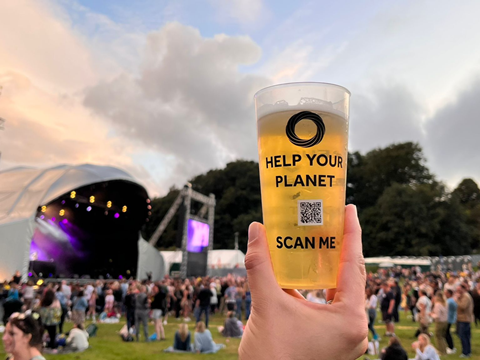
Reportedly avoiding 740,638 single-use products so far, Circulayo’s smart reuse technology aims to help local businesses transition into reuse with QR-enabled data tracking, branding customizability, and an upcoming ‘frictionless’ deposit system.
Approximately 7 million disposable cups are thought to be discarded in the UK every day, resulting in increased plastic pollution, carbon emissions, and pressure on local councils and businesses as disposal costs rise.
Circulayo’s solution utilizes its QR-enabled consumer engagement platform, AppNostic, with which consumers can scan the QR code on a reusable pack to find their nearest return points.
The code also leads to a personalized experience through which consumers can win ‘eco-rewards’, enter competitions, access sponsor promotions, and more. Businesses are encouraged to utilize its customizability to implement their own branding and messaging, advertise specific events or locations, and engage consumers.
In doing so, businesses are anticipated to boost their return rates and encourage environmentalist behaviours by forging stronger relationships with their audiences.
At the same time, Circulayo’s Flow Platform keeps track of transactions, reuse cycles, stock levels, and environmental savings across a reusable product’s life cycle, in real time. This is expected to help businesses gauge their environmental impact, implement precise figures into their sustainability reports, and confidently identify areas for improvement.
Additionally, the platform is set to help customers keep track of their stock levels and understand which products or content resonate most strongly with consumers.
Circulayo has already introduced its technology to various locations across Derby, England, including Derby County Football Stadium, venue spaces Derby Live and Vaillant Live, and smaller businesses like Down To Earth.
Since launching in 2021, it claims to have avoided 740,638 single-use products; reduced single-use plastic waste by over 14,812kg; prevented over 32,149kg of carbon emissions; and saved businesses over £100,000 (€115,810) in estimated costs. These figures depend on the types of single-use plastic products used, waste management resources, and labour costs.
Indeed, Circulayo emphasizes that its technology is not limited to reusable cups; it can reportedly be implemented for any reusable product, and is thought to be applicable for businesses of any size and industry.
While it forms partnerships with more local businesses, venues, and organizations, Circulayo is also introducing Tap & Return, its ‘frictionless’ and ‘simple’ deposit system designed to streamline the return process with a refundable deposit.
“Derby is showing that reuse doesn’t have to be complicated,” says Andy Flinn, CEO of Circulayo. “With the right technology, it becomes seamless, measurable, and engaging. It’s proof of what’s possible to enable a circular economy.”
Similar innovations include Reusables.com’s RFID-enabled, zero-deposit reuse system, which aims to lower single-use waste and streamline operational costs by offering reusable foodservice containers and smart return bins to university campuses, offices, hospitals, and other institutions.
Borro’s ‘frictionless’ reuse system also features an app-free, QR-driven return process to distribute beverage cups at events. It is thought to be ‘as easy as single-use’ and aims to improve return rates and consumer satisfaction.
If you liked this story, you might also enjoy:
The ultimate guide to the Packaging and Packaging Waste Regulation in 2025
How are the top brands progressing on packaging sustainability?
Everything you need to know about global packaging sustainability regulation in 2025
The key to increasing the use of reusable packaging in supermarkets













No comments yet